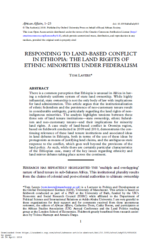
There is a common perception that Ethiopia is unusual in Africa in having a relatively uniform system of state land ownership. While highly influential, state ownership is not the only body of law with implications for land administration.
This article argues that the institutionalization of ethnic federalism and the persistence of neo-customary tenure result in considerable ambiguity, particularly regarding the land rights of nonindigenous minorities. The analysis highlights tensions between these three sets of land tenure institutions—state ownership, ethnic federalism and neo-customary tenure—and their implications for minority land rights.
A case study of land-based conflict in Oromiya region, based on fieldwork conducted in 2009 and 2010, demonstrates the continuing relevance of these land tenure institutions and associated ideas in land debates in Ethiopia, both in terms of the use of these ideas by protagonists as means of justifying land claims, and the ambiguous state response to the conflict, which goes well beyond the provisions of the land policy.
